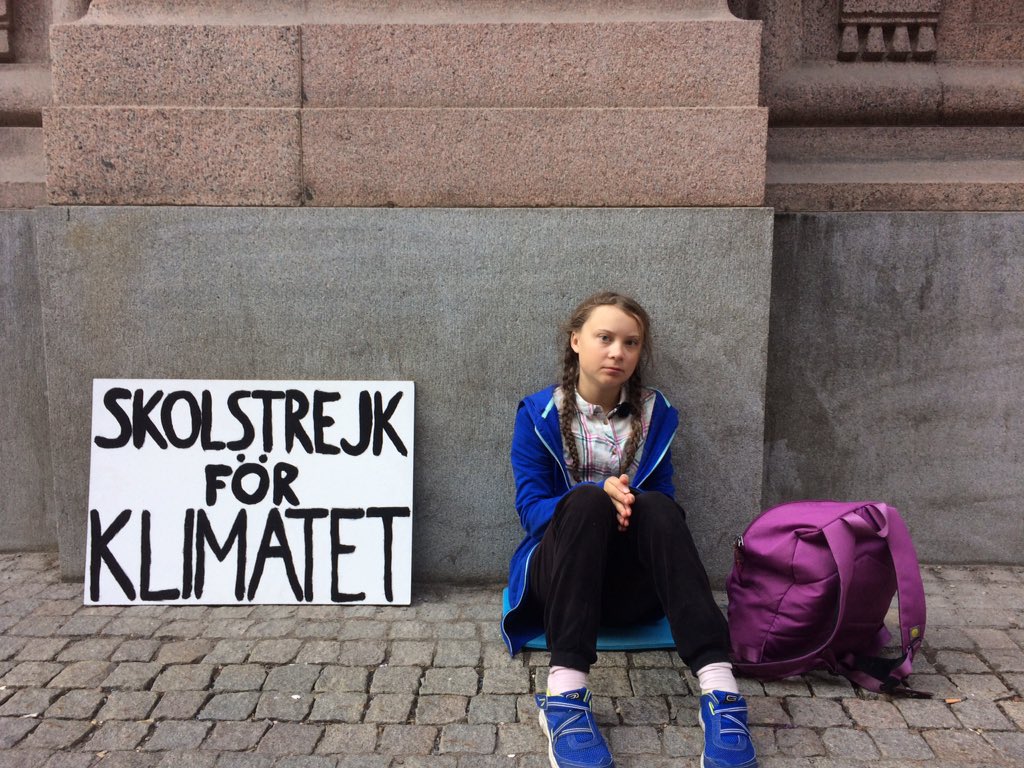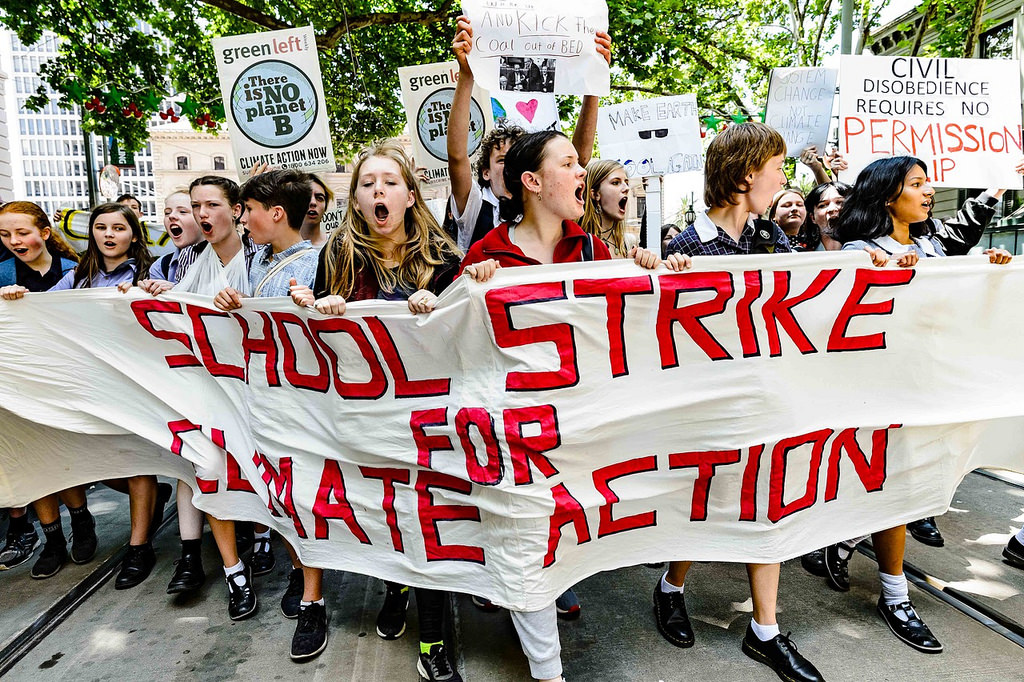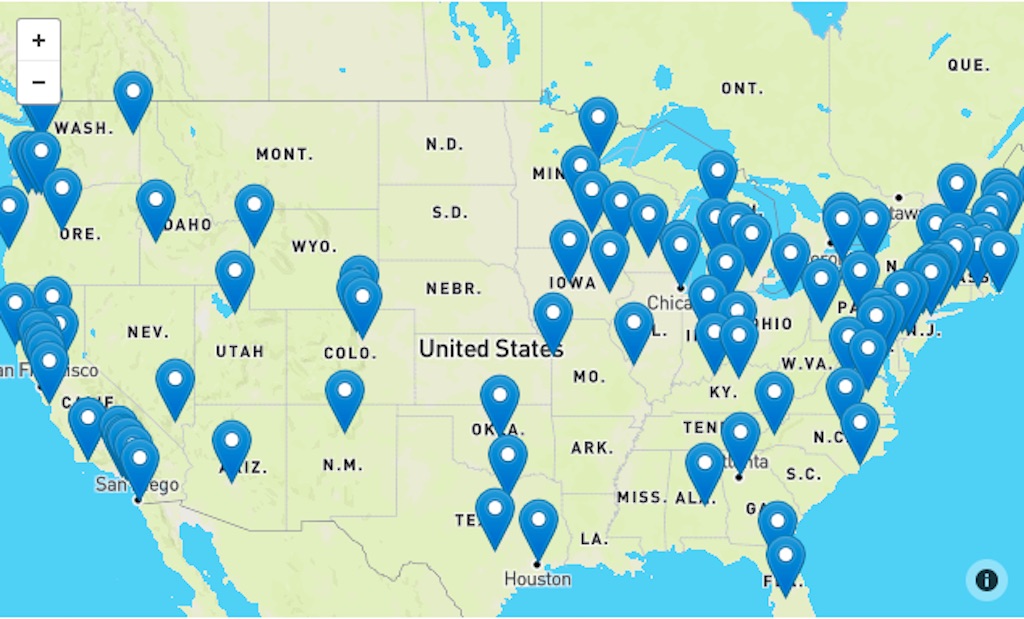Student climate strikes, which have become a powerful political force in Europe and Australia, are finally coming to the US. Over 100 protests are planned across the US for Friday, March 15.
Swedish teen Greta Thunberg, shocked that no one seemed to be taking climate change seriously, started the protest movement last summer. She skipped school to sit outside parliament to protest her government’s lack of action on global warming.

(Source: Greta Thunberg.)
Climate Change
Climate change means the change in weather patterns around the world because of human activity. Global warming is one result of climate change. The world is getting hotter, mainly because humans are burning “fossil fuels” like coal, oil, and natural gas to make energy.
The world’s countries have agreed to pollute less, but so far not much has changed. The effects of global warming will make life hard, and sometimes impossible, for most living things. Scientists say humans must take strong action before 2030 to avoid the worst effects of climate change.
Greta was ignored at first and spent a long time protesting alone. But by fall, things started changing. Her protests began to get attention. Soon lots of people were taking part and organizing similar protests around the world.
Since then, massive climate strikes have been held in many countries, including Sweden, Germany, Belgium, Australia, and the UK. Smaller strikes have been held in many more countries. The strikes are usually held on Fridays, which the protesters call “Fridays for Future”.

(Source: Julian Meehan/School Strike, via Flickr.com.)
Climate strikers have also been trying to make their voices heard in the US, but you might not have heard them. That’s because until now, US climate strikers have been in a situation much like Greta was when she started – mainly protesting alone and not getting much attention.
Alexandria Villasenor, 13, has been protesting in New York City since December. Every Friday, all through the winter, she’s been sitting outside the United Nations (UN) building with her signs. Alexandria protested alone for eight weeks before anyone ever joined her. This post is from week 8 of her protest, during the extreme cold of the polar vortex.
WEEK 8 of my @UN #ClimateStrike in the NYC polar vortex. I prepared all week for this and realized climate change will force us to live differently and deal with more extreme weather. People are dying right now, and we need to #ActOnClimate! @GretaThunberg @350 #FridaysForFuture pic.twitter.com/R6tWNNscGK
— Alexandria Villasenor (@AlexandriaV2005) February 1, 2019
Alexandria Villasenor, 13, has been protesting in New York City since December. Every Friday, all through the winter, she’s been sitting outside the United Nations (UN) building with her signs.
Similarly, 12-year-old Haven Coleman has been protesting in Denver. Sixteen-year-old Isra Hirsi has been working for environmental causes for about a year and she, too, has joined the climate strike movement.
Sixteen-year-old Isra Hirsi has been working for environmental causes for about a year and she, too, has joined the climate strike movement. The Sierra Club posted this picture of Isra online.
Yes, your kids are about to go on strike because you won’t do anything about climate change. https://t.co/kNWJXOyDH5 (via @sierra_magazine)
— Sierra Club (@SierraClub) February 20, 2019
Like Greta, the three found the protesting lonely at first. Alexandria protested alone for eight weeks before anyone ever joined her. Now the three are working together to organize a national climate strike in the US as part of a worldwide student climate strike on March 15.
Alexandria thinks young people should join the strike “because climate change will affect our generation the most and adults aren’t doing anything about it.”

(Source: Screenshot from Youth Climate Strike US.)
The map on the US student strike website shows over 100 protests happening across America, including Alaska and Hawaii. The strikes have local organizers, but the three teens are pulling it all together.
The students have a list of demands. Many of the demands focus on ending the use of polluting fuels by 2030. The students want a national emergency declared over climate change. They also want children to be taught about climate change from a young age and for government actions to be guided by scientific research.
Alexandria, Haven, and Isra are working together to organize a national climate strike in the US as part of a worldwide student climate strike. Haven posted about the experience online. She is writing lots of op-eds, which are like essays for newspapers.
Organizing a national strike is a lot like organizing a local rally/march, but op-eds, lots of op-eds and way more texts, email, decisions + zoom calls than I ever imagined humanly possible. If this is being an adult I’m not ok with growing up! ? #climatestrike @climatestrikeUS pic.twitter.com/bz5wAXDlDj
— Haven Coleman (@havenruthie) March 4, 2019
Several large groups, such as 350.org, GreenPeace, and the Sierra Club are supporting the student strikes. The students have also gotten a member of Congress to agree to join the strikes. Representative Ilhan Omar of Minnesota (who also happens to be Isra’s mother), will join the strike. She’s encouraging other members of Congress to join her.
But Alexandria isn’t expecting Friday’s strike to be the end of things. When asked about her plans for the future, she replied, “I’ll be back and striking again in front of the U.N. on Friday, 3/22. I’m not stopping.”
